
- Homepage
- Certification
- Coin Id
- Composition
- Grade
- Ruler
- Antoninus Pius (52)
- Augustus (141)
- Caracalla (53)
- Constantine I (57)
- Constantine Ii (29)
- Domitian (58)
- Gallienus (37)
- Gordian Iii (62)
- Hadrian (100)
- Marcus Aurelius (68)
- Nero (113)
- Nerva (31)
- Philip I (66)
- Septimius Severus (35)
- Severus Alexander (69)
- Theodosius Ii (32)
- Tiberius (69)
- Trajan (97)
- Trajan Decius (28)
- Vespasian (76)
- Other (1599)
- Year-mint-denom
JULIA DOMNA Authentic Ancient 196AD Silver Roman Coin PUDICITIA NGC i82580
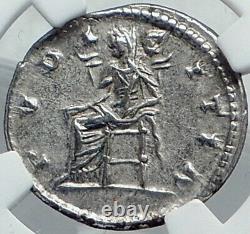
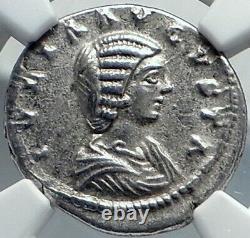
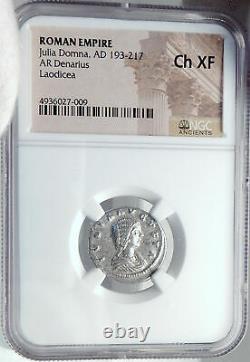
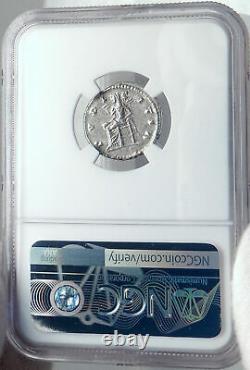
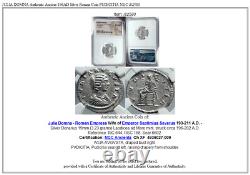


Item: i82580 Authentic Ancient Coin of. Silver Denarius 19mm (3.23 grams) Laodicea ad Mare mint, struck circa 196-202 A. Reference: RIC 644; RSC 168; Sear 6602 Certification: NGC Ancients. Ch XF 4936027-009 IVLIA AVGVSTA, draped bust right. PVDICITIA, Pudicitia seated left, raising drapery from shoulder.
Pudicitia ("modesty" or "sexual virtue") was a central concept in ancient Roman sexual ethics. The word is derived from the more general pudor, the sense of shame that regulated an individual's behavior as socially acceptable.
Pudicitia was most often a defining characteristic of women, but men who failed to conform to masculine sexual norms were said to exhibit feminizing impudicitia, sexual shamelessness. The virtue was personified by the Roman goddess Pudicitia, whose Greek equivalent was Aidôs.
Romans, both men and women, were expected to uphold the virtue of pudicitia, a complex ideal that was explored by many ancient writers, including Livy, Valerius Maximus, Cicero and Tacitus. Livy describes the legendary figure of Lucretia as the epitome of pudicitia. She is loyal to her husband and is modest, despite her incredible beauty. The story of Lucretia shows that the more virtuous a woman was, the more appealing she was to potential adulterers. Pudicitia was not only a mental attribute but also physical; a person's appearance was seen as an indicator of their morality.
The way a man or woman presented him or herself in public, and the persons they interacted with caused others to pass judgment on their pudicitia. For example, if a woman was seen associating with men other than her husband people would make a negative judgment on her pudicitia. Romans idealized the woman who was univira, a "one-man" woman, married once, even though by the time of Cicero and Julius Caesar, divorce was common, the subject of gossip rather than social stigma.
The opposite of pudicitia was impudicitia, "shamelessness" or sexual vice. " An assault on pudicitia was stuprum, sexual misconduct or "sex crime. Romans associated the loss of pudicitia with chaos and loss of control. In Cicero's oration against Verres, he discusses many of the governor's transgressions including sexual misconduct with both men and women. In the Imperial age, Augustus enacted a program of moral legislation to encourage pudicitia.According to Livy, there were two temples of Pudicitia in Rome. The original one was for women of the patrician class only, but when Verginia was excluded on account of marrying a plebeian consul, she and a group of plebeian matrons founded an altar of Pudicitia for women of the plebeian class as well.
Livy states that the plebeian shrine of Pudicitia eventually fell into disuse after its sacred character had been abused. Julia Domna, Latin: Iulia Domna ; c. 170 AD - 217 AD was a member of the Severan dynasty of the Roman Empire.Empress and wife of Roman Emperor Lucius Septimius Severus and mother of Emperors Geta and Caracalla, Julia was famous for her prodigious learning as well as her extraordinary political influence. Julia Domna was born in Emesa (known today as Homs) in Syria. She was the youngest daughter of the high-priest of Ba'al Gaius Julius Bassianus and sister to Julia Maesa, and she had two nieces: Julia Mamaea, mother of Severus Alexander, and Julia Soaemias, mother of Elagabalus. Her ancestors were Priest Kings of the famous temple of Elagabalus. The family had enormous wealth and was promoted to Roman senatorial aristocracy.
Before her marriage, Julia inherited the estate of her paternal great-uncle Julius Agrippa, a former leading Centurion. In the late 180s, Julia married future emperor Septimius Severus, usually considered to be of Punic background. They had two sons, Lucius Septimius Bassianus (Caracalla) in 188 and Publius Septimius Geta in 189. Because of her love of philosophy, Julia protected philosophers and helped philosophy to flourish in Rome. She was an imperial woman from 193-217 CE as wife to the emperor Septimius Severus and mother to emperors Geta (murdered by Caracalla in 211 CE) and Caracalla r.Julia Domna died shortly after her son Caracalla was murdered. Civil War or "Year of the Five Emperors".
After Commodus was murdered without an heir in 192 CE, many contenders rushed for the throne. An elder senator, Pertinax, was appointed by the praetorian guard. After bribing the guard, Iulianus was appointed emperor, and Pertinax was murdered. Septimius Severus, coming from the north into Rome, overthrew Iulianus and had him executed.
Septimius claimed the title of emperor in 193, and co-ruled Rome with Clodius Albinus until 195 CE when Septimius declared his sons AVGVSTVS, and defeated Albinus and his British legions. Septimius remained at war with an eastern rival to the throne, Niger, until he defeated Niger's forces in 201 CE. Julia Domna and her sons accompanied Septimius in his campaigns in the East. During this time, titles were granted to Julia Domna reminiscent of titles given to Faustina the Younger, including MATER CASTORVM, or mother of the camp, MATER AVGVSTVS, mother of Augustus, and MATER PATRIAE, or mother of the fatherland. Imperial Building Project: The aedes Vestae. The fire of Commodus in 192 CE destroyed areas of the aedes Vestae which includes the Temple of Vesta and the home, or Atrium, of the Vestal Virgins. Based on numismatic evidence, historical authors, and a laconic inscription found in situ, most scholars agree that Julia Domna funded restorations to the site during Septimius Severus's reign. Controversy and transition of power. As empress, Julia was often involved in intrigues and had plenty of political enemies, who accused her of treason and adultery. None of these accusations was proven. Severus continued to favour his wife and insisted on her company in the campaign against the Britons that started in 208. When Severus died in 211 in Eboracum (York), Julia became the mediator between their two sons, Caracalla and Geta, who were to rule as joint emperors, according to their father's wishes expressed in his will. The two young men were never fond of each other and quarrelled frequently. Geta was murdered by Caracalla's soldiers in the same year.Caracalla was now sole emperor, but his relations with his mother were difficult, as attested by several sources, probably because of his involvement in Geta's murder. Nevertheless, Julia accompanied Caracalla in his campaign against the Parthian empire in 217.
During this trip, Caracalla was assassinated and succeeded (briefly) by Macrinus. Julia chose to commit suicide after hearing about the rebellion, perhaps a decision hastened by the fact that she was suffering from breast cancer.
Her body was brought to Rome and placed in the Sepulcrum C. Caesaris (perhaps a separate chamber in the Mausoleum of Augustus). Later, however, both her bones and those of Geta were transferred by her sister Julia Maesa to the Mausoleum of Hadrian.If it were not for Julia, there would have survived little information about the philosopher Apollonius of Tyana. It was at the behest of Julia that Philostratus wrote his now famous Life of Apollonius of Tyana. Julia is thought to have died before Philostratus could finish his work of eight volumes. World-renowned expert numismatist, enthusiast, author and dealer in authentic ancient Greek, ancient Roman, ancient Byzantine, world coins & more. Ilya Zlobin is an independent individual who has a passion for coin collecting, research and understanding the importance of the historical context and significance all coins and objects represent.
Send me a message about this and I can update your invoice should you want this method. Getting your order to you, quickly and securely is a top priority and is taken seriously here. Great care is taken in packaging and mailing every item securely and quickly. What is a certificate of authenticity and what guarantees do you give that the item is authentic?
You will be very happy with what you get with the COA; a professional presentation of the coin, with all of the relevant information and a picture of the coin you saw in the listing. Additionally, the coin is inside it's own protective coin flip (holder), with a 2x2 inch description of the coin matching the individual number on the COA. Whether your goal is to collect or give the item as a gift, coins presented like this could be more prized and valued higher than items that were not given such care and attention to.When should I leave feedback? Please don't leave any negative feedbacks, as it happens sometimes that people rush to leave feedback before letting sufficient time for their order to arrive. The matter of fact is that any issues can be resolved, as reputation is most important to me.
My goal is to provide superior products and quality of service. How and where do I learn more about collecting ancient coins? Visit the "Guide on How to Use My Store". For on an overview about using my store, with additional information and links to all other parts of my store which may include educational information on topics you are looking for.
This item is in the category "Coins & Paper Money\Coins: Ancient\Roman: Imperial (27 BC-476 AD)". The seller is "highrating_lowprice" and is located in this country: US.
This item can be shipped worldwide.
- Certification Number: 4936027-009
- Certification: NGC
- Grade: Ch XF
- Composition: Silver
- Ruler: Julia Domna
- Denomination: Denomination_in_description
- Year: Year_in_description

